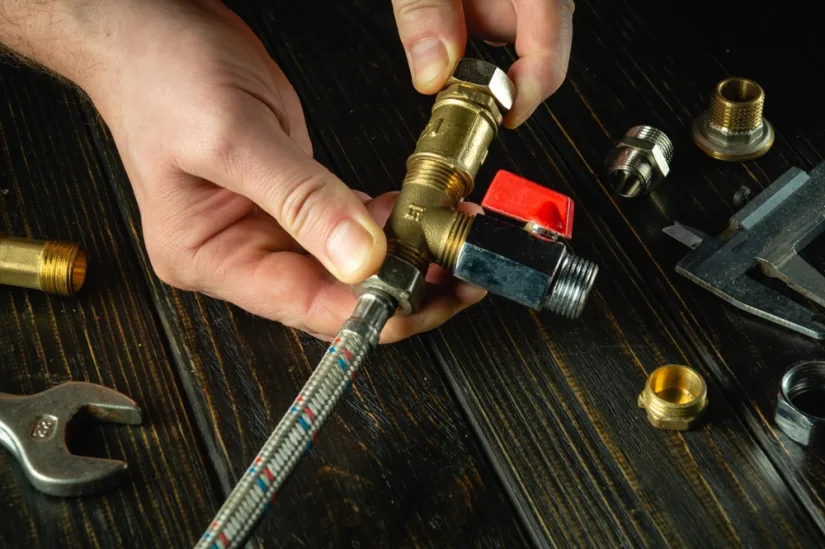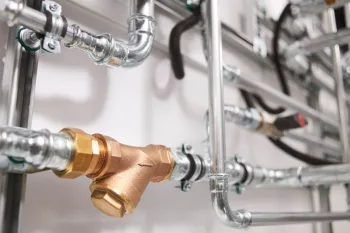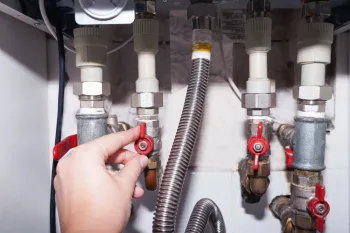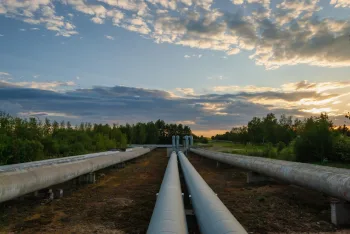
Maintaining proper gas pressure in commercial systems is essential for both safety and operational efficiency. Adequate pressure ensures gas appliances ignite reliably, operate at peak performance, and remain free from combustion problems.
When gas pressure falls below standard levels, it can lead to incomplete burns, equipment damage, and increased safety risks such as gas buildup within piping. If you’re facing commercial gas pressure issues, it’s time to call an experienced gas plumbing service provider equipped to fix the problem safely and reliably.
Common Causes of Low Gas Pressure
Undetected Leaks in the Gas Lines
One of the most frequent causes of low pressure is a gas leak, usually resulting from:
- Corroded or compromised piping
- Loose joints or deteriorated fittings
- Punctures caused by construction or rodent damage
Even small natural gas leaks can progressively reduce overall system pressure and pose serious safety risks.
Inadequate Main Gas Supply
If the main gas feed from the utility is undersized or overly pressurized at the source, commercial appliances may suffer from insufficient feed. This is often caused by:
- Economic supply constraints in peak usage periods
- Undersized utility lines relative to demand
- Malfunctioning regulators at the meter or upstream feed
Pressure Regulator Malfunction
Pressure regulators maintain consistent pressure. When they fail due to diaphragm wear, mechanical damage, or clogging, gas flow can become erratic or decline below operational thresholds.
Line Obstructions
Build-up inside gas pipes from rust, scale, debris, or residue can constrict flow and cause line pressure drops. Aging infrastructure is particularly prone to this issue.
Excessive Demand and Capacity Issues
Adding new appliances or increasing operational demand without modifying the plumbing system can lead to pressure drops. Undersized piping or inadequate branch lines cannot sustain load throughputs.
Underground Environmental Impacts
External factors like ground movement, backfill settling, or soil corrosion can stress buried pipelines, sometimes cracking or constricting gas flow gradually.
Faulty Gas Regulator or Gas Valve
If you suspect low gas pressure in your commercial building, the issue may originate at the gas meter or from a faulty gas regulator, both of which can restrict gas flow to your appliances. Problems often show up as inconsistent heating, soot buildup in your gas furnace, or multiple appliances failing to get enough gas.
A malfunctioning gas valve or pressure imbalance caused by propane tanks can also lead to gas pressure problems. If you notice rising energy bills or performance issues in other gas appliances, it’s essential to contact your gas provider or the gas company immediately for evaluation.
Preventive Measures to Avoid Future Gas Pressure Issues
Scheduled inspections and pressure profiling
- Use non-invasive gas sniffers, pressure gauges, and continuous loggers.
- Monitor pressure variances, especially post-installation or during peak operation seasons.
Regulator Testing and Calibration
- Replace regulators before they fail.
- Keep spare regulators on-site to quickly restore required pressure settings.
Buried Line Maintenance
- Conduct annual valve exercising, rust assessments, and complete cathodic protection monitoring.
- Apply protective coatings to underground pipelines to prevent corrosion.
Maintenance During Renovations or Expansions
- Include pressure capacity evaluation in any expansion plans.
- Plan branch line extensions so they keep proportional pressure on all appliances.
Safety Protocols for Dealing with Low Gas Pressure
Immediate Actions
- Shut down gas appliances until consistent pressure returns.
- Ventilate any affected areas thoroughly to disperse potential leaks.
- Avoid flame or spark sources in zones with pressure issues.
Diagnostic Leak and Pressure Testing
- Use soapy water tests, ultrasound detection, or infrared imaging to identify leaks.
- Conduct pressure tests at 1.5x normal operating levels to detect unseen system failures.
Regulatory Notification
- For systems over 2 psi or unexpected pressure failures, notify the local utility or authority immediately.
- Ensure repairs and inspections are documented for compliance with local codes and standards.
How Our Experienced Plumbers Will Address Low Gas Pressure Issues
At Coastal Commercial Services, Inc., we specialize in diagnosing and resolving low gas pressure events safely and effectively. Our strategies include:
Regular Inspections and Pressure Monitoring
- Precision testing: We conduct yearly or quarterly inspections using digital manometers and gas detection units.
- Baseline profiling: Establish and record acceptable pressure levels for each appliance and feed line for comparison.
- Continuous surveillance: On-site data loggers and remote telemetry alert us automatically when pressure drops or leaks occur.
Repairing and Sealing Leaks
- Priority leak response: Our 24/7 response service ensures small leaks are detected, classified, and sealed in record time.
- Gentle joint re-torquing: We recalibrate fittings without damaging threaded lines.
- Pipe relining and replacements: In cases of corrosion, we use pipe relining techniques or full section replacements with durable, corrosion-resistant piping.

Pressure Regulator Upgrades and Maintenance
- Regulator diagnostics: We measure and adjust diaphragm operation dynamically during inspections.
- High-performance replacement: We install commercial-grade regulators with zones tailored for high-demand feeds.
- Redundant systems: We propose dual-stage or parallel regulators to prevent single-point system failure.
Correcting Undersized or Obstructed Pipework
- Pipeline cleaning: We flush feed lines with clean gas to purge debris and sediment.
- Overlay or re-piping: Install parallel or enlarged supply piping where demand exceeds capacity.
- Material upgrades: We convert outdated galvanized or zinc-lined pipe to premium API-grade steel or CSST.
Capacity Evaluations for Expansions
- Before equipment additions, we perform volumetric and flow calculations to ensure line sizing prevents downstream pressure reductions.
- We design and install branch manifolds to evenly distribute flow throughout appliances.
Mitigating Environmental Risks
- We inspect underground pipelines for corrosion and soil chemistry issues.
- We reinforce protection on buried infrastructure with coatings, cathodic systems, or low-field bursting techniques when necessary.
Compliance Documentation and Certification
- We document test results, repair history, regulator calibration, and pressure logs per ANSI, NFPA 54, and state regulations.
- We provide program review packets demonstrating line integrity, leak remediation, and appliance readiness, aiding audits and insurance claims.
Call Our Dedicated Gas Line Repair Specialists Today
Low gas pressure impairs performance, compromises safety, and can disrupt commercial operations. Coastal Commercial Services offers a high caliber of inspection, repair, and upgrade services designed for commercial properties.
With industry-leading pressure testing, regulator oversight, leak management, and expansion planning, we ensure gas systems remain robust, code-compliant, and efficient. To schedule your service, call us at (772) 248-0490 or contact us online.



